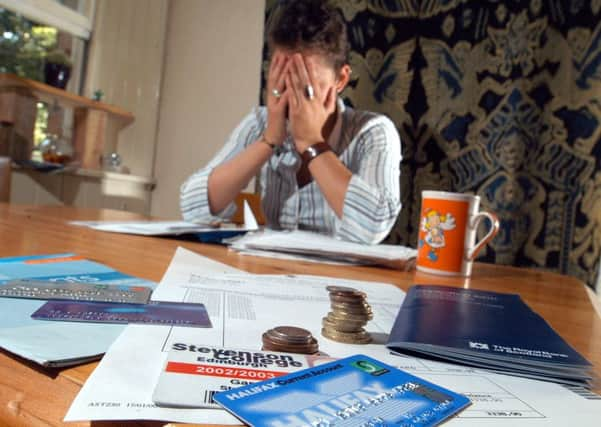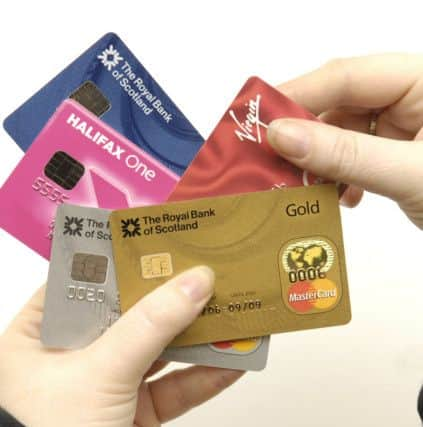How to deal with debt


If you’re in debt, don’t panic.
However, it’s important to do something, because the problem won’t just go away. Don’t ignore calls or letters from the people you owe money to (your creditors). Contact them to explain why you’re having problems and follow the steps in this fact sheet to help you get back in control of your finances.
If you don’t agree that you owe any money, or don’t agree with the amount you’ve been asked to pay, get advice from an experienced debt adviser straight away, before following these steps:


Make a list of your debts:
Advertisement
Hide AdAdvertisement
Hide AdBefore you can tackle a debt problem, you need to collect together information about your money affairs. Make a list of all your creditors. You will need the following
information for each debt:
- the name and address of the creditor.
- the account or reference number.
- the amount you owe.
It’s a good idea to keep the latest letter or statement for each debt together in one place so that you can easily find them if you need them. If you’ve received any court papers or letters that are urgent, for example, if a court date has been set, you may need to act quickly. If you’re not sure what you should do next, get advice straight away from an experienced adviser.
Once you’ve made a list of all your creditors, you need to work out which ones to deal with first. You need to deal with some debts first before others because the
consequences of not paying these debts can be more serious than for other debts.
The debts you deal with first are called priority debts. The debts you deal with after your priority debts are called non-priority debts.
Priority debts:
Priority debts include:
- mortgage or rent arrears. If you don’t pay these, you could lose your home. Check with a specialist adviser, for example, from a CAB, if there are any special schemes available to protect you from losing your home if you have mortgage arrears.
- fuel arrears. If you don’t pay these, your fuel could be cut off.
- council tax arrears. In Scotland you can’t be imprisoned for council tax arrears, but other methods can be used to enforce the debt, for example, your bank account or wages can be arrested or sheriff officers can seize some of your possessions.
Advertisement
Hide AdAdvertisement
Hide Ad- court fines for criminal offences, such as driving offences. If you don’t pay these you can ultimately be sent to prison.
- arrears of maintenance payable to an ex-partner or children. This includes Child Support you owe to the Child Support Agency or Child Maintenance Service. If you don’t pay these you can ultimately be sent to prison.
- income tax or VAT arrears. If you don’t pay these you could have your bank account or wages arrested or sheriff officers can seize your possessions. Adviceguide Advice that makes a difference
- loans are priority debts if they are secured against your home
- hire Purchase (HP) is a priority debt if it’s for an essential item, for example, if you have bought a car on HP and need the car to get to work.
Non-priority debts
Non-priority debts include:
- benefits overpayments
- credit debts such as overdrafts, loans, hire purchase (where it is for nonessential
goods, for example, a television), credit card accounts and catalogue
debts
- student loans
- money borrowed from friends or family.
You can’t be sent to prison for not paying non-priority debts. However, if you don’t make any offers to pay without explaining why, your creditors may take you to court.
Advertisement
Hide AdAdvertisement
Hide AdIf you still fail to pay, your creditors can take further court action against you, which could allow them to send sheriff officers to your home to take some of your possessions away.
If you owe more than £3000 your creditors can apply to make you bankrupt.
Step Two – work out your budget
List all the income and expenses for your household. Be honest and make sure that the amounts are realistic. You can use a budget sheet to help you do this.
Under income, include:
- earnings for your partner and yourself.
- any benefits you are paid, including Child Benefit and tax credits.
- maintenance from an ex-partner for you or your children. Include any Child Support from the Child Support Agency or Child Maintenance Service.
- contributions from other members of your family and any lodgers.
Think about the ways in which you might earn extra money or increase your income.
You may be able to claim benefits or tax credits.
Under expenses, include:
- housekeeping. Fill in realistic amounts for what you spend on all your expenses, including food, cigarettes and pet food.
Advertisement
Hide AdAdvertisement
Hide Ad- housing costs. This should include mortgage or rent, a second mortgage or secured loan, service charges and life or endowment insurance cover attached to your mortgage.
- council tax
- fuel charges
- telephone charges
- travel expenses. Include both public transport and the costs of running a car such as road tax, insurance, and maintenance
- insurance such as buildings and contents insurance on your home
- childcare costs
- TV licence and any TV rental costs
- clothes
- any other essential expenses - money you set aside for emergencies.
When you’ve added up all the figures, you’ll see if you have any money left over to pay your debts. You may even be able to see if you can make some savings. An advice agency can help you draw up a budget and help you increase your income if this is possible.
Step three - sort out your priority debts
When you’ve worked out how much you have left over after paying your expenses, contact each of your priority creditors. Show them your budget and try to make an arrangement to pay back what you owe.
For example, you may be able to pay an extra bit each month until the arrears are cleared. Or you may not have any extra money at the moment but know you will have a lump sum in three months’ time which will clear the debt completely.
If you can’t afford to pay anything to your priority creditors and your situation isn’t likely to get better, the outcome may be very serious. Get advice straight away.
Step four - sort out your non-priority debts
Advertisement
Hide AdAdvertisement
Hide AdHow you deal with your non-priority debts will depend on whether you have any money left over after dealing with your priority debts and paying for essential household expenses like housing costs and food.
If you have money to spare, you may have several options for dealing with your non-priority debts. You may have the option of:
- making offers to creditors yourself. An experienced adviser can help you to do this
- arranging a Debt Payment Programme (DPP) under the Debt Arrangement Scheme (DAS). DAS is a scheme set up by the Scottish Government to help people manage their debts. Once your DPP has been approved you make one regular payment to a payment distributor, who sends the money to your creditors. You can’t apply directly for a DPP. An approved money adviser must
make the application on your behalf. You can find out more about DPPs and how to find a DAS approved money adviser on the website: www.dasscotland.gov.uk
- arranging a Trust deed with your creditors. This is a legally binding agreement between you and your creditors. Your assets and property are passed to a trustee who will manage your financial affairs with the aim of paying your creditors as much as possible of the debt owed to them. If your trust deed becomes protected your creditors can’t take further action against you or make you bankrupt. You need to have a minimum of £5,000 worth of debt in order to set up a protected trust deed and you will normally be expected to make regular
payments towards your debts for 4 years. After the 4 years, if you have cooperated with the trustee, you will usually be discharged from the protected trust deed and most remaining debts will be discharged. There is more information about trust deeds on the Accountant in Bankruptcy’s website at www.aib.gov.uk.
-putting all your debts into one loan, for example, by remortgaging, if you have equity in your home. This is called loan consolidation. It isn’t usually a good idea to borrow more money to get out of debt and there can be serious disadvantages. Make sure you get advice before you take out another loan.